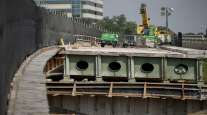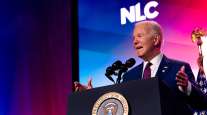Highway Reauthorization Bill Still Stalemated in Congress
This story appears in the Dec. 20 & 27 print edition of Transport Topics. Click here to subscribe today.
The year began with hopes the Obama administration and Congress could end their stalemate over the highway bill. But like 2009, this year is expected to end without a new long-term reauthorization agreement.
As far back as January, Transportation Secretary Ray LaHood was predicting that a new bill would be completed during 2010.
“President Obama wants a robust, comprehensive transportation bill,” LaHood said. “The problem is that bill costs between $400 billion and $500 billion, [but] I believe we will get there this year.”
A leading voice on transportation issues in the House, Rep. James Oberstar (D-Minn.), chairman of the Transportation and Infrastructure Committee, said at the time that if the administration would have come “onboard with some increase in the user fee, . . . we’d have had a bill signing by now.”
After a few short-term extensions of the previous highway bill, which first expired in September 2009, Rep. Peter DeFazio (D-Ore.), the chairman of the House’s highways panel, said in February there may have been “some shift in the administration’s proposal.”
However, Congress continued to extend the bill throughout the year, with a minor hiccup in late February — when an extension was held up over deficit concerns.
The one-week gap in the program led to a furlough of nearly 2,000 federal employees and cost states roughly $157 million a day in highway funding.
Ultimately, an extension of the bill though the end of 2010, along with an infusion of $20 billion, was included in a package of tax cuts and other programs aimed at creating jobs that President Obama signed in March.
With the extension in place, officials continued to express hope that a bill would get done — but without specifics about how it would be funded.
“[The] biggest problem that we face in trying to move forward . . . is the fact we have a serious revenue shortfall,” said Jim Kolb, a Democratic aide on the House transportation panel.
Tom Lynch, an aide to Sen. Max Baucus (D-Mont.), chairman of the Senate Finance Committee and a member of the Environment and Public Works Committee, said that writing a bill without identifying a funding source or the size of the bill “gets to be a difficult thing.”
American Trucking Associations President Bill Graves gave voice to that frustration during the summer, effectively giving up on a bill being passed in 2010.
“I just simply don’t see a scenario where there’s a vote on the floor of the House and the Senate and a signature by a president that’s going to infuse a significant amount of new money into road and bridge construction,” he said. “There are no champions.”
In the fall, President Obama signaled that he may yet be that champion, calling for a $50 billion one-time investment in highways and other infrastructure as part of a six-year authorization plan that would repair or rebuild 150,000 miles of roads.
Highway advocates, including ATA, welcomed the proposals. However, the proposals failed to gain traction in Congress.
Graves cited the proposals, and Obama’s contention that there’s no reason not to invest in infrastructure, in his state of the industry address at ATA’s Management Conference & Exhibition in October. Graves said the reason the highway bill had stalled was a lack of political will.
Also at MCE, Arizona Senator Jon Kyl, the No. 2 Republican in the Senate, said there likely would be a short-term extension of the bill, with a short window of early 2011 for passage of a long-term package.
Those predictions, however, could be complicated by the Republicans’ newly won control of the House. Democrats still hold a majority, albeit a much smaller one, in the Senate.
Rep. John Mica, a Florida Republican and the incoming chairman of the transportation panel, said a new bill was his “top legislative priority.”
Obama concurred, saying after the election that infrastructure issues could be an area to find bipartisan agreement.




